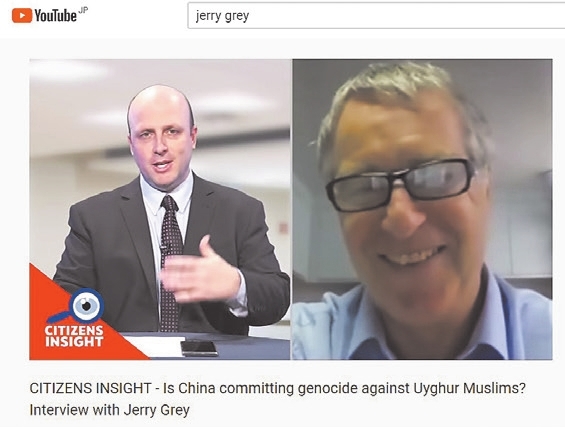




Editor’s Note: A growing number of foreigners who are living or have lived in China are now presenting China’s real life to the outside world through their videos and tweets. Today, we present you the second of a series of stories about the social media influencers who are endeavoring to right the wrong of the Western perception of China. Lin Min linmin67@hotmail.com JERRY GREY, a U.K.-born Australian, came to China in 2004 with many stereotypes and doubts about the country. During his first several months working as a teacher in Zhongshan City, Guangdong Province, all he wanted was to finish his 10-month contract and get out of the country because of the inconvenience he experienced in a city with very few foreigners. But now, after 16 years living in China, and cycling about 30,000 km around the country, Grey, a former British police officer, declares that “I’m now an active China supporter” after witnessing the tremendous changes in China, especially the significantly improved lives of the Chinese people. In addition to maintaining his YouTube channel and an account on Medium, an online publishing platform, he is on Twitter almost every day and writes extensively about China. His Twitter account, under the name “Jerry’s China,” currently with around 15,200 followers, records his cycling trips around China, his views on the country and his rebuttals of various misunderstandings and lies concerning the country, especially about Xinjiang, which he has visited several times since 2005. Some of his articles were translated into Chinese and published on Toutiao, and one of the articles received more than 1 million views, according to Grey. The real Xinjiang When he cycled from Guangdong to Ningxia, Gansu and Xinjiang in 2014, a 4,500-km trip that took him and an expat friend, Phil Behan, to more than 20 cities in 57 days, he witnessed “devastatingly poor people, some living in caves, using donkeys for transportation, and roads that were not much more than dirt tracks” in some rural areas. In 2019, when he cycled through the same region again in a reverse journey, this time with his wife Liang Yuhua and fellow Australian Bevan Cobbe, he found amazing differences: “There are cars, shopping centers, main roads and new, modern apartment blocks” in the previously barren and dilapidated areas. During both trips in Xinjiang, Grey said, he saw heavy security but “I have never witnessed any form of oppression, never seen any signs of oppression or persecution. If Uygurs are being forced to work, I saw no indication of it, most of them are happy to interact with a stranger on a bike,” he wrote in an email to Shenzhen Daily. Debunking lies When Xinjiang became a highly contentious topic worldwide earlier this year, Grey defended China vigorously. In an article published on Medium on March 1, Grey debunked allegations by Nathan Ruser, a 22-year-old former university dropout who works as a researcher with the Australian Strategic Policy Institute (ASPI). Ruser had falsely labeled some commercial and public buildings in Xinjiang as detention centers. Grey pointed out that Ruser, despite being touted as an expert on the situation in Xinjiang, has never visited Xinjiang, not even been to China. ASPI derives much of its income from the Australian Government and other sponsors that include the likes of Raytheon, BAE and Lockheed Martin, all part of the Military Industrial Complex, Grey said, citing publicly available information. He also took a swipe at a BBC report on Xinjiang: “Throughout the report not one local person was interviewed,” he said, adding that the article is supported by unsubstantiated documentation provided by Adrian Zenz, an infamous far-right bigot on a self-proclaimed “mission from God” to destroy “communist China.” Extensive travels Because of his staunch support of China, “I have received some criticism from both the ABC and Rupert Murdoch press. They never interview me, but post inaccurate information about me,” he said. Western criticism has left Grey unfazed. In fact, Grey’s confidence in speaking out for China derives from his understanding of the country through extensive travels. Working for different organizations in the past, which included training, consultancy and even examining, he has stayed in more than 100 cities and there are only four provinces he has not visited. “I think it’s fair to say, I’ve seen more of China than most Chinese people,” he said. In addition to the two one-way cycling trips to and from Xinjiang, in 2018 Grey biked from Harbin in Northeast China to Zhongshan in South China, a trip covering more than 3,600 km. In cycling across the country, “I’ve slept on the floors of restaurants, I’ve slept in bus shelters and under bridges, I’ve camped in deserts and on mountains, I’ve been to five-star luxury resorts and I’ve stayed in the meanest of guesthouses which might rent a room for as little as US$4 a night,” he wrote in an article published on Medium in February 2021. People’s party Grey has called China his home for 16 years but “the adjustment was not easy” for him. “There are aspects of living in China that are difficult [for expats], such as banking, hotel check-ins, medical treatment and a few others,” he said. However, “I have seen incredible improvement in the lives of Chinese people since I arrived. Most of my Chinese friends have cars and apartments now, many did not. Lifestyle is much more modern and convenient now and this has all happened in the last 15-20 years,” he told Shenzhen Daily. When asked to comment on the Communist Party of China, he said: “They are very definitely a party of the people and for the people.” “I like the [Chinese] government and what it does. I like how it works and how it manages aspects of everyday life,” he added. Grey revealed that his wife’s parents are members of the Party, a fact he did not learn until 12 years after he knew them. “I’ve never seen them use their membership to gain any influence and they certainly have not benefited financially; they live a very modest life on modest pensions in a modest house,” he wrote in an article in February. In China, “The people are the party and the party is the people,” he added. Contributions to charity Grey had worked as a police officer in the United Kingdom for 10 years before moving to Australia in 1987. Down under, he started working with a security company at the very bottom of the ladder, and became the general manager of a division of the multinational company 18 years later. After leaving the company, he moved to China, where he worked as a teacher and an IELTS examiner, studied Chinese culture and achieved a master’s degree in cross-cultural change management. His cycling trips to and from Xinjiang in 2014 and 2019 were partly aimed at raising money for disabled people. In doing so he has been part of a group that has raised over 4 million yuan (US$617,950) in charitable donations, he said. He has won charity awards from Zhongshan and Guangdong authorities for his contributions to charity in the region. Grey, 62, no longer working full-time, is free to do a lot of things he would like to. One of them is to travel across the country and let the world see the real China. Grey and his wife returned to Zhongshan on Thursday after a 45-day cycling trip in the Guangxi Zhuang Autonomous Region and parts of Guangdong. He said he loves to visit Shenzhen for a short stay and enjoy the cosmopolitan feel of it. He also approves of the city’s efforts to adopt a green transport system. “When ‘developed’ countries consider the benefits of electric vehicles and how to implement infrastructure required to support them, Shenzhen, China already has all buses, most taxis and over 60,000 delivery vans on the grid. All GBA cities are doing this,” he tweeted April 19. | 
